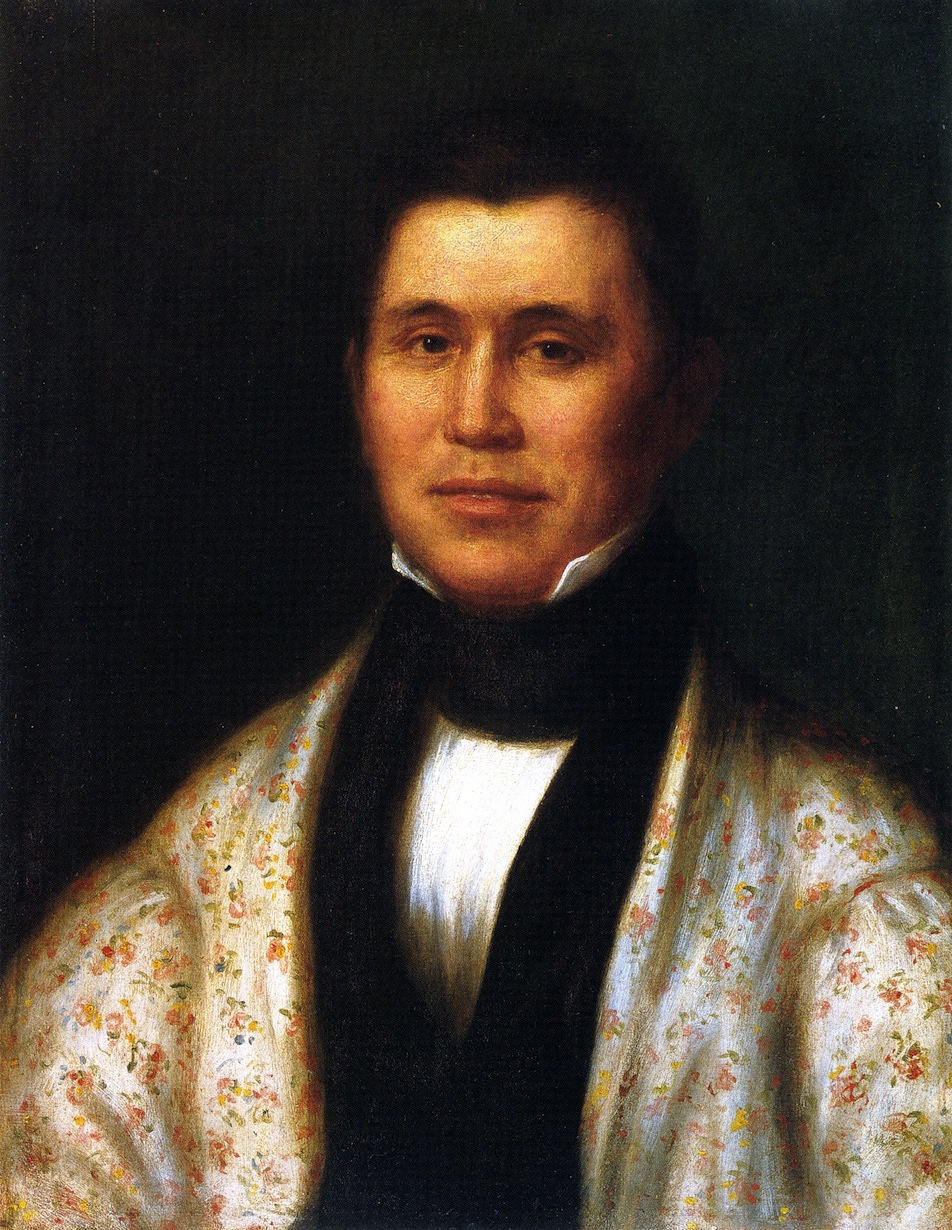Rev. Jesse Bushyhead (1804-1844) was a pivotal figure in the history of the Cherokee Nation. As a Baptist minister and a respected leader, he played an influential role in the spiritual and political life of the Cherokee people during a period marked by significant upheaval and change. His leadership during the Trail of Tears, a tragic and defining moment in Native American history, underscores his enduring legacy.
Early Life and Background
Rev. Jesse Bushyhead Sr., a descendant of Ludovic Grant, was born in 1804 at Mouse Creek near present Cleveland, Tennessee, the son of (John) Bushyhead and his wife Nancy “Nannie” Foreman, both Cherokee. His sister Nancy married John Walker Jr., a bigamist, Treaty Party member, and descendant of the Cherokee “beloved woman” Nancy Ward. After Walker was assassinated in 1834, his widow Nancy married Lewis W. Hildebrand.
Jesse was educated at Candy Creek Mission and taught at several schools for boys in the Candy Creek section. Growing up, Bushyhead was exposed to both Cherokee traditions and European-American influences, which shaped his worldview. His education was a blend of traditional Cherokee teachings and the European-American schooling system at Candy’s Creek Mission. This unique educational background equipped him with the skills to navigate and bridge different cultures, an ability that proved crucial in his later life.
He attended the missionary school of Evan Jones, and assisted Jones in the translation of the New Testament into Cherokee. He was baptized in 1830, ordained as a Baptist minister in 1833, and served as pastor of the Amohee church.
Role in the Cherokee Nation
As a prominent member of the Cherokee Nation, Rev. Jesse Bushyhead was deeply involved in both its political and spiritual spheres. He advocated for Cherokee sovereignty and worked tirelessly to protect their lands and culture from encroachment by European-American settlers. He served as a member of the Cherokee National Council and played a significant role in the negotiation of treaties with the United States government. His fluency in both Cherokee and English made him an invaluable communicator and mediator between the Cherokee Nation and the United States, especially during the tumultuous period leading up to the Trail of Tears.
Afterward, Bushyhead was a principal participant in the formation of the new Cherokee government, providing stability in the turbulent struggle between factions. And although without legal training, he served the new government as a chief justice of the Cherokee Supreme Court.
In addition to his political role, Bushyhead was a spiritual leader. His deep faith and position as a Baptist minister allowed him to influence the religious practices within the Cherokee community. He worked tirelessly to integrate Christian teachings with Cherokee traditions, fostering a unique religious identity among his people.
The Trail of Tears
The Trail of Tears, a forced relocation of the Cherokee people in the 1830s, was one of the most tragic events in Cherokee history. In 1838 Jesse Bushyhead and missionary Evan Jones accompanied the Cherokee on the Trail of Tears. Jesse’s sister Nancy traveled with her husband Lewis W. Hildebrand who became assistant conductor of the Brown detachment. She died during the journey.
Rev Bushyhead was responsible for guiding his detachment of nearly 1,000 Cherokees from their ancestral homeland to the Indian Territory, present-day Oklahoma. Despite the harrowing conditions, Bushyhead conducted religious services, offered spiritual guidance, and advocated for the welfare of the travelers throughout the difficult journey.
Evan Jones’ oldest son Samuel also went as an assistant wagonmaster. Missionary Daniel S. Butrick made the journey and kept a journal. The majority of mountain Cherokee from North Carolina went with Jesse Bushyhead and conductor Situagi in detachments 3 and 4. Evan Jones was an assistant to Situagi because he could neither read nor write English. The first contingent began the long journey on October 1, 1838. Jesse Bushyhead’s contingent left October 5, and Jones left the 16th, yet Jones overtook Bushyhead by the 27th due to their oxen eating poison plants.
Detachments three and four reached Nashville on November 4th and a newspaper there wrote about Jones and Bushyhead:
“Four detachments of the emigrating Cherokee have, within a few days, passed through our city and seven others are behind and are expected to pass in a day or two. They average about a thousand each. Of the third party, our brother, Evan Jones, who had been eighteen years a missionary in the nation is conductor, and the fourth is under the direction of the celebrated Dtsakagedhee , known among us as Bushyhead. In the two parties they direct we learn there are upwards of 500 Baptists. During two or three days that their business detained them in the vicinity of the city, we have had the pleasure of some intercourse with these and others of our Cherokee brethren; and more lovely and excellent Christians we have never seen.”
Arrival:
“A company of 1,033 Cherokee from the Valley Towns of East Tennessee in charge of Rev. Evan Jones arrived February 2; these were all that remained of the original party numbering 1,250, headed by Situakee, who traveled with sixty-two wagons and 560 horses. There were seventy-one deaths and five births among them. The people of this party were strongly religious and maintained their church organization and services on the road with the inspiration of their Baptist conductor. Next behind them was the party headed by Rev. Jesse Bushyhead, a Cherokee Baptist minister who interpreted for Mr. Jones. His people numbered at the beginning 950, but he lost thirty-eight by death and after accounting for six births, he delivered 898 in their new home, February 23.”
Emmett Starr wrote that “Reverend Bushyhead established a camp near the Arkansas line upon his arrival in 1839, at which rations were issued to needy emigrants and for this ration the camp was locally known as “Bread Town,” but he immediately commenced his religious work here and the location soon became known as Baptist Mission”.
Religious Contributions
Rev. Jesse Bushyhead’s contributions to the spiritual life of the Cherokee people were substantial. As a Baptist minister, he was instrumental in the spread of Christianity among the Cherokee. His sermons, often delivered in the Cherokee language, resonated deeply with his congregation, blending Christian principles with traditional Cherokee beliefs. He established several churches and was involved in translating the bible and religious texts into the Cherokee language making them accessible to a broader segment of the Cherokee people. This work significantly influenced the religious landscape of the Cherokee Nation
Role in the Cherokee Nation
Jesse Bushyhead emerged as a prominent figure in the Cherokee Nation, advocating for the rights and welfare of his people. He was deeply involved in the political sphere, playing a significant role in the Cherokee National Council. His leadership was characterized by a strong sense of justice and an unwavering commitment to the Cherokee community.
His spiritual influence was equally significant. As a Baptist minister, he worked tirelessly to integrate Christian teachings with Cherokee traditions, fostering a unique religious identity among his people. His efforts in translating religious texts into the Cherokee language were instrumental in preserving their language and culture.
Later Life and Legacy
The final years of Jesse Bushyhead’s life continued to be marked by his dedication to the Cherokee people and their welfare. Emmet Starr wrote: “Reverend Bushyhead was one of the leaders of the Ross party, being at the time of his death on July 17, 1844, Chief Justice of the Cherokee Nation. His disinterestedness in the feudal and political troubles among his people gained for him the pecular distinction of being the only man of any consequence among the Cherokees who habitually traveled among his people in the troublous period of 1830-46, unarmed, except, as he said, with his Bible”.
On Wednesday night, July 17, 1844, after a brief illness, Jesse Bushyhead, still a young man only forty years of age, was called to his reward. In the old “Baptist Mission” cemetery near Westville is a monument at his grave on which is this inscription: “Sacred to the memory of Rev. Jesse Bushyhead, born in the old Cherokee Nation in East Tennessee, September, 1804; died in the present Cherokee Nation, July 17, 1844. ‘Well done, thou good and faithful servant; thou hast been faithful over a few things, I will make thee ruler over many things. Enter thou into the joy of thy Lord.'” An inscription in Cherokee is at the bottom. On the other side is the inscription:
“Rev. Jesse Bushyhead was a man noble in person and noble in heart. His choice was to be a true and faithful minister of his Lord and Master rather than any high and worldly position. He loved his country and people, serving them from time to time in many important offices and missions. He united with the Baptist Church in his early manhood and died as he had lived, a devoted Christian.”
Rev. Jesse Bushyhead’s life story is more than a biography of a Cherokee leader; it is a narrative of courage, faith, and resilience in the face of adversity. His contributions to the Cherokee Nation, both in its darkest and rebuilding times, highlight his profound impact on its history. As a bridge between cultures and a beacon of hope during the Trail of Tears, his legacy continues to resonate in the collective memory of the Cherokee people and in the broader tapestry of American history.

